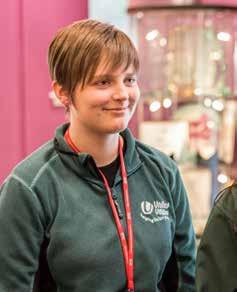
6 minute read
PEOPLE POWER
Harnessing people power within and without
SPOTLIGHT ON LOUISE BEARDMORE AND UNITED UTILITIES
LOUISE BEARDMORE, CUSTOMER SERVICES AND PEOPLE DIRECTOR AT UNITED UTILITIES, TALKS TO JUSTINE GREENING ABOUT HER APPROACH TO SOCIAL MOBILITY.
JG // Unusually, your role spans HR and customer services. I guess it’s about happy people on the inside equalling happy people on the outside?
LB // People often say it’s a strange combination but my retort is that it’s all about people. One thing is about service to customers and one is about service to employees. But actually, it’s brilliant employees that deliver fantastic service for our customers. So they go together really, really well. My role helps to make sure that our people are connected to the customers and the communities that we’re privileged to serve.
JG// Interestingly, affordability and helping customers to manage bills is a key part of your social mobility drive.
LB// Over 50 per cent of our customers don’t have £300 worth of savings to pay for an unexpected bill. Also, if we look at the customer base here in the North West, 30 per cent of people earn less than £21,000 a year, and aren’t on any form of benefit. So really it’s about understanding the financial challenges that customers have and offering targeted and tailored services to them.
JG// And Covid-19 has made the scale of challenge you’re facing as a region even tougher – where do you go with some of your social mobility programmes now?
LB// I think one of the big challenges we’re going to have is working out at what point we’re going to see secure, meaningful employment actually return and I’m mindful that many organisations, because of the challenges financially, will stop things like apprenticeships and work placement programmes. We’re actively trying to do quite the opposite, and make sure those programmes continue. We’re also using digital classrooms and having lots of online careers forums to make sure that the notion of careers stays alive. We’ve got to work doubly hard to make sure that we’re reaching those people who would perhaps think United Utilities is something that isn’t obtainable in terms of securing their future.
JG// Being a FTSE100 company, you also have the ability to shape the broader business environment in these difficult times.
LB// United Utilities, as one of the biggest organisations here in the North West, needs to play that leading role in terms of having some of these difficult conversations. It’s really easy to make decisions which are potentially short sighted about stopping training and development and I don’t want to be in a situation where a whole generation gets forgotten because of short term decisions. So how do we come together as leaders here in the North West to make sure that we’re all doing the right things to respond to COVID but also to make sure that we’ve got future capability, because now more than ever, we’re going to need innovative, passionate, capable people? And we’re going to need to unlock talent for the new world that we’re entering into.
Helping opportunity flow across the North West

HOW WATER SERVICES COMPANY UNITED UTILITIES IS LEVERAGING ITS CLOSE CONNECTIONS WITH DISADVANTAGED COMMUNITIES TO DELIVER OPPORTUNITY AND PROSPERITY.

As a service provider to households across North West England, United Utilities has direct links with many areas of limited social mobility. It delivers 200 million litres of water a day to more than three million homes and businesses in the North West. The company employs over 5,000 people, while its work spans reservoirs, treatment works and pumping stations and thousands of kilometres of water pipes and sewers. This thriving network of activity – and its direct links with disadvantaged communities – make it a powerhouse of opportunity in its native region. Its social mobility cycle flows through its entire organisation, bringing in new talent from a range of backgrounds – and setting it up for success in varied careers. According to data cited by the company, the North West has 41 per cent of the most deprived areas of the country, with 27 per cent of households earning less than £21,000 a year. Almost half (47 per cent) of households have less than £100 in savings to cover an unexpected bill. Economic disadvantage, disability and gender bias are among several social mobility barriers circumnavigated by the firm. While its model feeds a diverse mix of talent into its own organisation, it is also inspiring more people to seek careers in the utilities sector generally, as well as the wider STEM world. The UK’s social mobility dearth is characterised by an even spread of talent across the UK versus an uneven spread of opportunity. London generally has the bulk of opportunities, although they are not all accessible to people from disadvantaged backgrounds living in the capital. Young people pursuing careers outside London, meanwhile, have fewer opportunities to choose from. United Utilities is addressing this in the North West by not only creating more opportunities – but also ensuring they are accessible and designed to enable employees to fulfil their potential. Its efforts to intervene in the lives of young people not in employment, education or training are proving particularly fruitful; three quarters of people involved in this programme go on to find paid work. But also, they build confidence and raise their aspirations, enabling them to progress out of often very difficult situations. Apprenticeships are similarly successful, being rated as ‘very good’ by Ofsted and showing a 100 per cent hit rate in terms of leading to employment. United Utilities is also providing a pathway into employment for people from disadvantaged backgrounds who graduate from the increasingly social mobility-focused higher education sector. The roles available to graduates are wide-ranging, exciting and rewarding, as reflected in the company’s strong graduate retention stats. It has a clear focus on diversity and inclusion too, and has achieved ‘Disability Confident’ status as an employer. This is a government scheme which recognises organisations playing a leading role in changing attitudes for the better - and reaping the benefits of inclusive recruitment practices. Overall, United Utilities has developed and actioned an innovative and well-resourced social mobility drive. As well as enabling more people to fulfil their potential, however, it is also playing a pivotal role in addressing the skills shortages looming over the utilities sector and, vitally, nurturing interest in STEM subjects. Partly this comes through its sponsorship the North West’s first STEM Centre of Excellence, which has been built at Beamont Collegiate Academy in Warrington. Also, in 2015 it opened a £1.5m technical training centre in Bolton with the aim of developing the next generation of engineers. Between 2015 and 2023 it is on track to develop over 1,000 engineering and technical employees, despite major challenges in this area facing engineering-relevant industries across the UK. This achievement is underpinned by a commitment to training and development that is also integral to its social mobility impact. Another major contributor to its social mobility influence is its efforts to support households where money worries may be threatening their ability to get on in life. The firm has a number of support schemes which help customers who may be struggling with bills. Currently it is helping around 100,000 customers in this way. The business also runs a regular affordability summit to understand more about the individual challenges faced by customers and how this should inform its customer relationships. In summary, through careful planning, significant investment and a long-term commitment to change, United Utilities is facing the social mobility challenge head on and providing a compelling example to other PLCs.












